Appleby-in-Westmorland Coving Installation (CA16): The even, harsh lines seen where ceilings meet walls can often seem harsh to some homeowners, and the traditional way of dealing with this is to soften them by installing fancy mouldings or coving. Trends change through the years and the use of coving in interior design is a good example, one year it's in, the next it's out, yet homes in Appleby-in-Westmorland continue to be embellished with this useful addition. In the end, of course, it should be down to personal choice, whether or not to have coving installed in your property. You have a simple choice to make, should you opt for stark, contemporary lines or rounded, classic transitions?
What is Coving? - Coving is a shaped, moulded material, sold in strips, which can be used as a decorative element to cover up the sharp, ninety degree angles between room surfaces (walls and ceilings). A wide variety of materials are used to make decorative mouldings and coving and these include plastic, MDF, gyproc, hardened polyurethane, extruded PVC, polystyrene, duropolymer, hardwood and paper covered plaster.
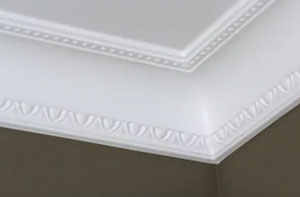
Aside from lots of materials, there are also numerous shapes and designs such as ogee (or cyma reversa), Victorian, egg and dart, cyma recta, Edwardian, dentil, ovolo, cavetto, art deco and step.
For a subtle yet powerful addition to any room's interior design, coving can be the perfect finishing touch. The curvy shape of coving can provide a polished finish to your home by smoothing the transition between ceilings and walls. Choosing the perfect coving for your home can be a daunting task due to the sheer variety of patterns and materials available. When picking coving, it's crucial to take into account your personal preferences and the decor of your home. To achieve the best outcome for coving installation, it's essential to ensure that the process is done to a high standard.
With so many possibilities available to you, it may be tricky for you to determine what is best for you. It will all become a lot more straightforward when you get advice and guidance from a specialist Appleby-in-Westmorland coving installer who is in the know. It is always best to get a bit of professional help when you want to achieve a top quality coved finish on your Appleby-in-Westmorland property.
Any experienced Appleby-in-Westmorland coving installation specialist will be just as happy doing coving repairs and refurbishment work as they will be creating new interiors. If the installation of decorative mouldings and coving is done correctly, they ought to survive unscathed for many years, though from time to time repairs might be necessary. For example, you might need the restoration of coving, wall plaques, dado corners, dado rails, panel mouldings, picture rails, fire surrounds, cornices, ceiling roses or corbels.
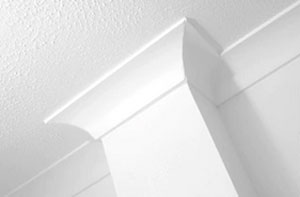
When looking into tradesmen for your coving work you have a few choices. You could find a specialist coving fitter in Appleby-in-Westmorland, you could employ a plasterer, or in the case of wooden mouldings, a joiner. You should invariably check that anybody you employ is fully skilled in work of this nature. If a high quality finish is crucial to you (as it ought to be), you need someone with a careful and meticulous approach to their work.

A common mistake that lots of Appleby-in-Westmorland people make, is automatically going for the cheapest coving installer, when the estimates come in. Cheap isn't necessarily best and you don't want to have to call in someone else later to correct poorly executed work. When all is said and done, if you want the final look of your coving to be outstanding, you need to pick the right person for the job.
When you are trying to find coving fitters in Appleby-in-Westmorland, there are a few ways in which you can set about it for example you can use a trade portal such as Local Heroes or Rated People, you could check out local newspapers or classifieds, you could try searching on Social Media such as Facebook or you can visit the FMB (Federation of Master Builders) website and do a search for approved local plasterers. You're able to search for coving related products like coving packs, ceiling roses, coving adhesive, pre-cut coving corners and coving cutting tools by going to B&Q, Jewson, Wickes or Coving Direct, and you'll be able to purchase tools and equipment for plastering and coving (if you fancy doing it yourself) by searching through the websites of Artex Ltd, Screwfix or Tool Station.
Coving installation can be undertaken in Appleby-in-Westmorland and also in: Coupland, Burrells, Flakebridge, Maulds Meaburn, Colby, Kirkby Thore, Long Marton, Great Ormside, Keisley, Little Ormside, Sandford, Brackenber, Crackenthorpe, King's Meaburn, Dufton, and in these postcodes CA16 6HT, CA16 6HR, CA16 6SB, CA16 6SA, CA16 6TN, CA16 6XS, CA16 6XA, CA16 6XE, CA16 6HP, and CA16 6QR. Locally based Appleby-in-Westmorland coving specialists will probably have the phone code 017683 and the postcode CA16. Checking this should ensure that you access locally based coving fitters. Appleby-in-Westmorland property owners will be able to benefit from these and numerous other related services. To make enquiries and obtain quotes for coving and cornice installation, you just need to click on the "Quote" banner.
Maintenance and Repair
The repair and maintenance of coving and cornices are integral to preserving your property's good condition. Coving and cornices have the potential to add an elegant touch to a room, but as time rolls on, they can deteriorate due to cracks, discolouration or damage.
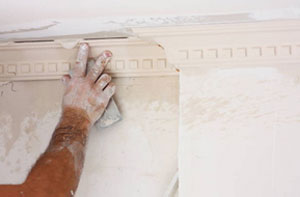
To prevent further damage, it is necessary to carry out regular inspections and quickly make any repairs that are needed. Depending on the severity of the damage, repairs to coving and cornices can be as simple as filling in cracks and smoothing rough areas, or as complex as replacing whole sections. Repairing cornices and coving with the appropriate materials and techniques is crucial to achieve a flawless finish that matches the original pattern.
Neglecting the upkeep of coving and cornices can cause structural damage that might compromise the integrity of the building. Complex repairs or the restoration of heritage coving and cornices may require the expertise of professionals. Proper maintenance and repairs of cornices and coving can preserve their beauty and add value to a property for many years to come.
What Tradesman Puts up Coving?
Craftspeople who specialise in installing coving typically fall into three categories: painters and decorators, plasterers and carpenters. Plasterers, with their expertise in decorative moldings, often take on coving installation, which involves shaping and attaching plaster or gypsum-based strips to the intersection of walls and ceilings, resulting in smooth, seamless finishes. Carpenters also handle coving installation, particularly when it's made of wood or MDF (medium-density fiberboard). They meticulously measure, cut, and fit wooden coving pieces to create elegant and intricate designs. Both plasterers and carpenters ensure that coving not only enhances the room's aesthetic appeal but also conceals imperfections in wall-ceiling junctions, lending a cohesive and polished look to interior spaces. Painters and decorators may also handle coving installation, especially when it's made from polyurethane, duropolymer or polystyrene.
Is Coving a Messy Job?
Coving installation is not the most tidy of tasks. It entails applying plaster or adhesive to the ceilings and walls, then securing decorative moulding in place. This process produces dust, debris, and the potential for spills. Cutting and fitting the coving can also generate waste materials. While professionals employ dust sheets and protective measures to minimise mess, some level of cleanup is typically required afterward. DIYers in Appleby-in-Westmorland may find it messier due to a lack of proficiency. In general, while coving can provide an elegant finishing touch to a room, it does involve a degree of messiness that requires management.
Plaster Coving Installation Appleby-in-Westmorland
A touch of style and elegance is added to any room with plaster coving, a decorative moulding that enhances the junction between walls and ceilings. These detailed and durable decorative mouldings are generally made from gypsum plaster, which is often reinforced with hessian or fibreglass. From simple curves to intricate patterns, it comes in a range of designs, making it ideal for both contemporary and classic interiors in Appleby-in-Westmorland. To conceal imperfections and achieve a seamless finish between the wall and ceiling, many homeowners in Appleby-in-Westmorland choose plaster coving.
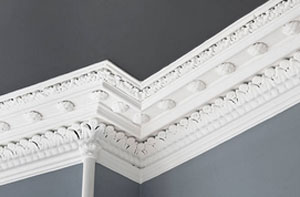
While plaster coving installation may appear straightforward, it is important to remember that a decent finish requires precision and skill. Accurate coving cuts, perfect mitred corners, and secure fixing are ensured by hiring a professional. The correct materials and tools, used by a professional installer, guarantee precise adhesive application, seamless gap filling, and a flawless final result.
By choosing a professional for your plaster coving installation, you save time and energy while guaranteeing a high-quality finish that enhances your home. Professionals can offer advice on the best type of coving to match your decor and ensure that the installation process is quick and efficient. With their expertise, you can enjoy the timeless beauty and added value that well-installed plaster coving brings to your home in Appleby-in-Westmorland. (Plaster Coving Appleby-in-Westmorland)
Picture Rails
Picture rails are mouldings that are affixed horizontally to walls, usually 12 to 24 inches below the ceiling. They were initially conceived for hanging pictures without causing damage to the walls with nails, screws, or hooks. Instead of drilling into the wall, you can use picture hooks that sit neatly on the rail, making it easy to change or move your photos or artwork whenever you like.
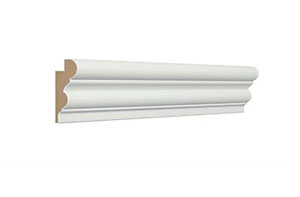
Adding both functionality and a decorative touch, these rails were very popular in Edwardian and Victorian homes. These rails are a common feature in older properties, but their classic look and practical use continue to appeal to lots of people in Appleby-in-Westmorland today. Picture rails can also be used to visually break up tall, featureless walls, adding character to the room.
With fundamental carpentry skills, installing a picture rail can be considered a simple task for DIY enthusiasts. Involvement in this task includes measuring, cutting the rail material to the correct dimensions, and fixing it to the wall, generally with nails or screws. Once installed, the rail can be stained or painted to complement your existing decor, adding both functionality and style to any room. If you're unwilling or unable to install picture rails yourself, contact a local Appleby-in-Westmorland coving installer. (Picture Rail Installation Appleby-in-Westmorland)
Gyproc Coving Appleby-in-Westmorland
Gyproc coving is a decorative feature used to improve the appearance of the junction between ceilings and walls in Appleby-in-Westmorland. Made out of pre-formed plasterboard, it comes in a variety of different sizes and designs to suit different types of rooms. Adding a bit of elegance to any space, installing this type of coving creates a smooth transition from wall to ceiling and hides any unsightly cracks or imperfections.
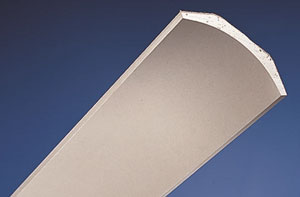
The installation process isn't that difficult. The coving pieces are trimmed to the dimensions of the room and secured in place with a strong adhesive. For a perfect finish, joints and gaps are filled and then sanded smooth. For home and property owners looking to improve their interiors' appearance without the requirement for extensive refurbishments, Gyproc coving is an attainable DIY project.
Gyproc coving also comes with practical benefits. Providing a longer-lasting, cleaner look, it can help cover cracks that may develop over time at the ceiling-wall junction. Allowing for further customisation, coving can be painted to match or contrast with the room's decor. Enhancing the functionality and beauty of a room is simple and effective with Gyproc coving. (Gyproc Coving Appleby-in-Westmorland)
Custom Mouldings
For those looking to elevate their interiors, custom mouldings offer the ideal solution. These decorative details add elegance and personality to your home, whether you're restoring the charm of a period house or modernising a more contemporary space. From ceiling roses and cornices to bespoke skirting boards and architraves, custom mouldings provide a flexible way to create a cohesive and personalised aesthetic in your Appleby-in-Westmorland home.
Custom mouldings offer unparalleled versatility, with choices in materials like wood, plaster, and cutting-edge composites. Whether you prefer the classic appeal of detailed plasterwork or the minimalist aesthetic of modern mouldings, these custom options ensure a perfect match for your design goals. It's all about creating harmony within your space, giving it a cohesive and elevated feel that suits your taste.
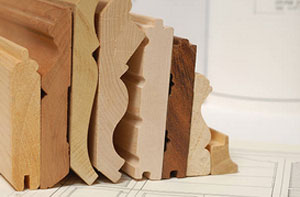
Custom mouldings do more than just enhance the look of your home; they also serve practical purposes. For instance, skirting boards protect walls from everyday scuffs and scrapes, while coving can cleverly hide any cracks where the ceiling meets the wall. By integrating style with functionality, these features create a smart solution for maintaining a well-kept, polished home.
Custom mouldings are best installed by professionals who have the right skills. The precision needed for a perfect fit is something that only comes with experience and a careful eye for detail. By calling on an expert, you can be assured that every piece will be expertly cut and fitted, merging smoothly with your current walls, ceilings, or doorways. Furthermore, they'll offer advice regarding the most suitable materials and finishes to realise your vision, resulting in a smooth process and breathtaking outcomes.
To sum it up, investing in custom mouldings is a brilliant way to add a personal touch to your home and boost your property's value. Whether you're going for understated refinement or a more daring statement, these decorative features can really change the game. With the right design paired with professional installation, you can make your space feel truly special, merging timeless elegance with functional practicality. (Tags: Custom Mouldings Appleby-in-Westmorland).
Wooden Coving Appleby-in-Westmorland
Wooden coving, positioned where the wall meets the ceiling, serves as a decorative element that imparts elegance to any room. Wooden coving is produced in a multitude of finishes and styles, from contemporary to classic, to complement various tastes and interior design schemes. Not only does coving add to the visual charm of your property in Appleby-in-Westmorland, but it also hides any unattractive joints or imperfections where the ceiling meets the wall.
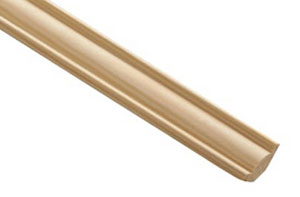
To guarantee wooden coving fits seamlessly and looks professional, one must possess skill and precision. The process involves measuring the area, cutting lengths of coving to the correct size, and attaching it securely with adhesive and nails. Careful sanding and painting or staining may also be necessary to complement the coving to your current decorative scheme. Despite some homwowners who are passionate about DIY potentially tackling this task alone, securing professional installation services assures a flawless and consistent finish.
To take the headache out of fitting timber coving, professional installation is recommended. To achieve a high standard and successful completion, competent installers bring the necessary knowledge and tools. From the initial consultation and measurements to the final details, they handle everything, ensuring your home is enhanced with beautifully finished coving. Ensuring the coving is both durable and visually appealing, investing in expert installation also saves you valuable time. (Wooden Coving Appleby-in-Westmorland).
Polyurethane Coving
A synthetic polymer, polyurethane is known for being both light in weight and highly durable, as well as versatile.` Offering a number of distinct advantages, polyurethane coving mimics the complex patterns of conventional plaster coving.
The Benefits of Polyurethane Coving:
- Easy Installation: Unleash your inner do-it-yourself expert! The installation of this sort of coving requires just simple tools and readily available adhesives. For complex projects and intricate designs, professional installation is recommended. However, the straightforward process for fitting makes polyurethane coving a DIY-friendly option for many.
- Economical: Whilst the initial price of polyurethane coving per metre might be slightly higher than basic plaster coving, consider the bigger picture. The lower risk of damage during fitting and ease of installation translate to significant cost savings over time.
- Versatility: Polyurethane coving isn't just an addition - it's the perfect finishing touch for any room. With a wide selection of styles available, from understated contemporary profiles to ornate Victorian designs, you can find the ideal coving to seamlessly complement the existing decor in your home and create a truly seamless look.
- Moisture Resistance: Polyurethane is largely unaffected by moisture, making it suitable for use in bathrooms and kitchens, where levels of humidity can fluctuate.
- Lightweight: Say goodbye to heavy lifting! Polyurethane coving boasts a dramatically lighter weight when compared with plaster. This translates to easier handling and installation, particularly for DIY fans. Moreover, the lighter weight minimises the risk of damage to your walls and ceilings during the fitting process.
- Durability: A serious downside to plaster coving is its tendency to become brittle and break over time. Polyurethane coving overcomes this weakness entirely. Its exceptional resistance to chipping, cracking and warping guarantees a beautiful and long-lasting addition to your home.
- Low Maintenance: Polyurethane coving doean't need much maintenance. Unlike fragile plaster, it won't crumble and only needs occasional dusting or wiping with a dampened cloth.
- Pre-Primed: Pre-primed polyurethane coving offers an often overlooked benefit - it saves you time and energy! You can bypass the priming stage completely and move straight to applying your chosen topcoat for a flawless finish. This translates to a faster and more effortless painting process.
For those seeking a practical and aesthetically pleasing option, polyurethane coving offers a good alternative to conventional plaster coving. Its wide range of styles, durability and ease of installation make it a much favoured choice for homeowners and interior designers alike. With a well-considered plan and meticulous execution, polyurethane coving can be the key to unlocking a touch of sophistication and elegance in any room.
DIY Coving Installation
Installing coving as a DIY project can be a gratifying way to add a bit of elegance to your home without requiring professional help. Accurate measurement is the first step—ensuring your walls are measured correctly is key to having the coving fit snugly in place. Since coving generally requires angled cuts, having a mitre box and fine-tooth saw on hand will make the cutting both easier and more precise.

Ensure the surfaces are clean and free of dust or debris before starting to fix the coving to the walls. A strong adhesive or coving adhesive is ideal for attaching it, but don't forget to apply a generous amount to ensure a firm hold. Gently position the coving, making adjustments as necessary, and remove any surplus adhesive before it dries.
The last stage involves using a decorator's caulk or filler to seal the edges and fill any gaps. Once the surface is dry, smooth out any rough patches by sanding them down, preparing it for painting. Improving both the appearance of your Appleby-in-Westmorland home and offering a satisfying project, DIY coving installation is perfect for those keen on enhancing their space themselves. (Tags: DIY Coving Appleby-in-Westmorland)
Bespoke Archways and Alcoves Appleby-in-Westmorland
In the world of architecture and interior design, bespoke alcoves and archways have long been celebrated as classic elements that can transform a space from everyday to extraordinary. Functional purposes of architectural features include defining areas within a room, providing storage solutions, or simply adding a little charm and elegance. These features are also aesthetically pleasing. Let's discover why bespoke archways and alcoves continue to be cherished elements in interior design by delving into their world.

Bespoke Archways: Archways are architectural marvels that have graced structures for hundreds of years, dating back to ancient civilizations such as the Romans. Modern interior design is seeing a significant comeback of bespoke archways today. The styles of custom-crafted arches vary, from the more modern, minimalist designs to the classic Roman arch.
Bespoke archways offer a notable advantage in creating a flowing sense of transition between spaces. Connecting different rooms, they create an open and inviting atmosphere while maintaining a feeling of separation. Archways can also serve as focal points, drawing attention to particular areas or architectural details within a space. Custom archways, crafted from plaster, wood or stone, can be tailored to match the overall aesthetic of your space, adding a bit of character and sophistication. This is another advantage of bespoke archways.
Alcoves: Alcoves, recessed spaces in walls, have many uses. For centuries, these charming niches have been used to display artwork, house books, or create cosy reading corners, adding both charm and function to any space. Bespoke alcoves allow Appleby-in-Westmorland homeowners to personalise these spaces according to their unique needs and preferences, surpassing traditional alcoves in versatility.
The Perfect Marriage: The integration of bespoke alcoves and archways can lead to a visually stunning and harmonious interior. Drama and anticipation can be fostered by having a tailor-made archway which leads into a room adorned with a carefully designed alcove. Serving as a frame, the archway throws a spotlight on the alcove, bringing depth to the entire design and showcasing its contents.
In summary, as statements of design and craftsmanship, bespoke archways and alcoves transcend their basic architectural element role. They possess the ability to transform a space, endowing it with elegance, character, and functionality. Displaying your collection of art, creating a cosy reading nook, or adding a timeless allure to your home are aspirations that bespoke alcoves and archways can fulfill, standing as design decisions that will persist through time and augment your living space in many ways. (46435 - Alcoves and Archways Appleby-in-Westmorland)
Appleby-in-Westmorland Coving Related Tasks

Appleby-in-Westmorland coving specialists will likely help with bedroom coving, ornate arches, plaster cornicing, the installation of plaster coving, lightweight coving, cheap coving installation in Appleby-in-Westmorland, the installation of Georgian coving, duropolymer coving, Victorian coving, the installation of cornices, kitchen coving, ogee coving, Georgian coving, gyproc coving, the installation of Victorian coving, traditional coving, polystyrene coving, ornate coving installation in Appleby-in-Westmorland, the replacement of coving, wood coving, bespoke coving, the installation of decorative coving, picture rails, cornicing, coving repairs, wooden cornice, living room coving, the installation of duropolymer coving, plaster cornice repairs, coving removal and other coving related work in Appleby-in-Westmorland. Listed are just a handful of the duties that are conducted by local coving fitters. Appleby-in-Westmorland companies will keep you informed about their whole range of services.
Appleby-in-Westmorland Coving Services
- Cheap Coving
- Coving Fitting
- Coving Removal
- Coving Services
- Coving Replacement
- Wooden Coving
- Plaster Covings
- Coving Installation
- Plastic Covings
- Ceiling Roses
- Dado Rail Installation
- Coving Suppliers
- Gyproc Coving
- Coving Cutting
Coving Installers Near Appleby-in-Westmorland
Also find: Long Marton coving installers, Sandford coving installers, Kirkby Thore coving installers, Coupland coving installers, Dufton coving installers, Keisley coving installers, Colby coving installers, Maulds Meaburn coving installers, King's Meaburn coving installers, Flakebridge coving installers, Great Ormside coving installers, Crackenthorpe coving installers, Little Ormside coving installers, Brackenber coving installers, Burrells coving installers and more. It's possible to get coving installed in all of these towns and areas. These seasoned craftspeople bring their expertise to ensure accurate and professional coving installation in your property. Homeowners are assured of correct coving installation and an improvement in their homes' beauty and character by engaging a certified professional for this task. If you're a local householder looking to obtain accurate and competitive coving installation quotes tailored to your specific needs, you just have to click here.
Coving Enquiries

Current coving postings: Samuel Wright from Great Ormside asked the question "are there any decent plaster coving fitters near me?". Christina Lock from Flakebridge was interested in getting some plaster coving installed. Susan Fox needed a quote for fitting some gyproc coving on her cottage close to Sandford. Danielle Lane from Colby wanted to have some wood coving replaced. Kayla Chambers from Burrells wanted to have some wood coving replaced. Zachary and Haley Moore asked for a quote for repairing some duropolymer coving on their house near to Sandford. Kelsey Lee wanted a price quote for repairing some duropolymer coving on her terraced home close to Crackenthorpe. Cody Young from Long Marton asked the question "are there any decent plaster coving fitters near me?". Alexandra Johnson was trying to find coving installers near Colby. Brittany Hughes from Coupland needed to have some duropolymer coving installed. David Evans wanted a quotation for replacing some wood coving on his terraced house near to Brackenber. Sara Thomson was trying to find coving installers near Little Ormside. Kaitlyn Campbell was trying to find coving installers near Crackenthorpe.
 Coving Installation Appleby-in-Westmorland
Coving Installation Appleby-in-Westmorland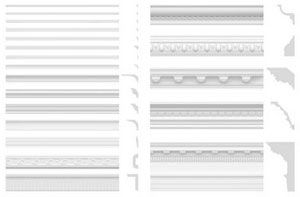 Coving Installers Near Appleby-in-Westmorland
Coving Installers Near Appleby-in-Westmorland Coving Fitters Appleby-in-Westmorland
Coving Fitters Appleby-in-Westmorland
More Appleby-in-Westmorland Tradespeople: Not surprisingly, when you're doing home renovations in Appleby-in-Westmorland, you are likely to need all sorts of different tradespeople and along with a coving fitter in Appleby-in-Westmorland, you might also need an emergency locksmith in Appleby-in-Westmorland, a general builder in Appleby-in-Westmorland, wallpaper stripping services in Appleby-in-Westmorland, SKIP HIRE in Appleby-in-Westmorland, waste removal in Appleby-in-Westmorland, a carpenter/joiner in Appleby-in-Westmorland, a wallpapering specialist in Appleby-in-Westmorland, a plumber in Appleby-in-Westmorland, a window fitter in Appleby-in-Westmorland, an electrician in Appleby-in-Westmorland, a floor screeder in Appleby-in-Westmorland, ceiling cornicing in Appleby-in-Westmorland, a painter & decorator in Appleby-in-Westmorland, and other different Appleby-in-Westmorland tradesmen.
More: Coving Specialists, Polyurethane Coving, Cornicing Services, Plastic Coving, Coving Installers, Cornices and Coving, Wooden Coving, Coving and Cornices, Coving Specialists, Coving Services, Cornicing Services, Cornicing Services, Cornicing Services, Polyurethane Coving, Cheap Coving, Coving Fitters, Coving Installers, Coving and Cornices, Lightweight Coving, Coving Services, Cheap Coving Fitters, Plastic Coving, Coving and Cornices, Coving and Cornices, Plastic Coving, Coving Services, Coving Cutting, Polyurethane Coving, Coving Specialists, Lightweight Coving, Gyproc Coving, Cheap Coving Fitters, Coving, Coving Fitters, Coving Fitters, Plastering Firms, Plastering Contractors, Domestic Plastering, Patch Plastering, Rendering.
Coving fitters CA16 area, and dialling code 017683.
TOP - Coving Installation Appleby-in-Westmorland
Coving Fitters Near Me - Mouldings and Dado Rails Appleby-in-Westmorland - Coving Installers Appleby-in-Westmorland - Ceiling Rose Installation Appleby-in-Westmorland - Coving Fitters Appleby-in-Westmorland - Coving Removal Appleby-in-Westmorland - Coving Repairs Appleby-in-Westmorland - Cornice Fitters Appleby-in-Westmorland - Coving Specialists Appleby-in-Westmorland




